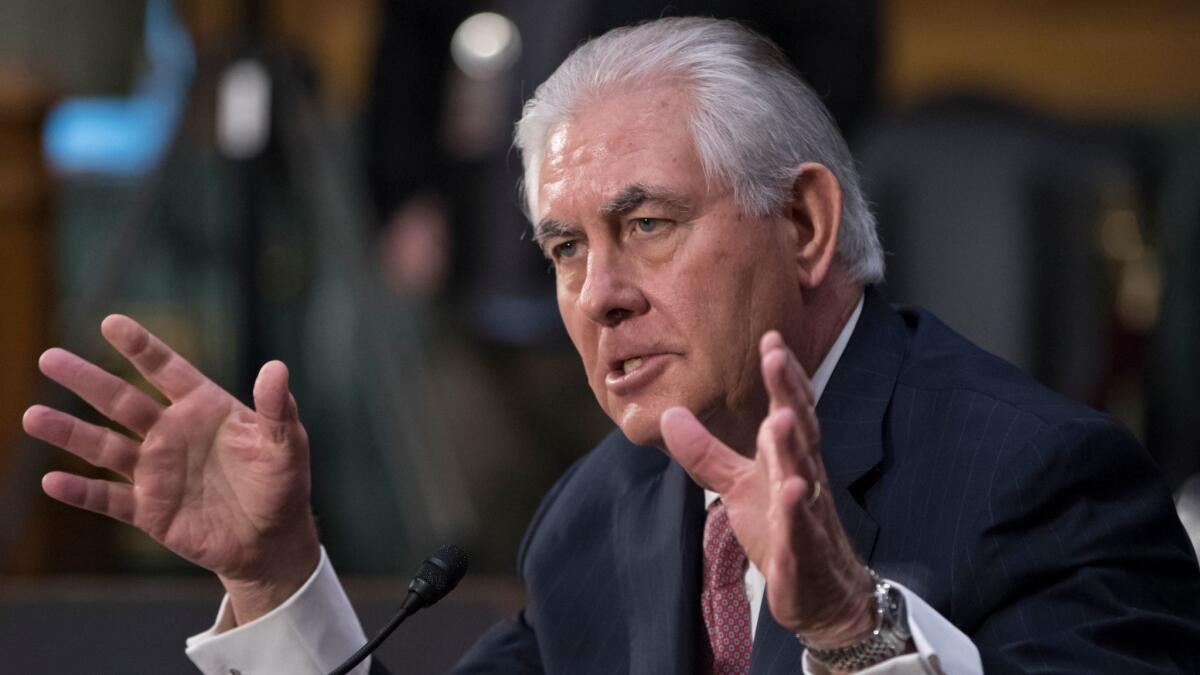Trump’s pick for secretary of State raises concern with aggressive comments about China

- Share via
Reporting from New York — Did Rex Tillerson, President-elect Donald Trump’s choice for secretary of State, misspeak or did he intend to take a stand that if implemented could be interpreted by China as an act of war?
Tillerson said during his confirmation hearing Wednesday that the United States would have to block China’s access to artificial islands that the country is building to assert its claim over disputed waters in the South China Sea. The U.S. position is that these are international waters, where ships from all countries are free to travel.
“This is a threat to the entire global economy if China is allowed to somehow dictate the terms of passage through these waters,” Tillerson told the Senate Foreign Relations Committee.
The Obama administration has sent warships close to the artificial islands to challenge Beijing’s territorial claims in the South China Sea. But Tillerson’s comments had foreign policy experts in the United States and China scratching their heads in befuddlement.
“Unless Washington plans to wage a large-scale war in the South China Sea, any other approaches to prevent Chinese access to the islands will be foolish,’’ editorialized the Global Times, the state-run Chinese newspaper known for its nationalistic views.
Pressed by reporters at a news conference Thursday, China’s Foreign Ministry spokesman Lu Kang declined to speculate about what Tillerson might have meant, or how Beijing might respond. But he defended China’s actions in disputed waters as “above reproach.”
As a practical matter, we don’t have the maritime power to set up a blockade in the South China Sea.
— Carl Baker, former Air Force officer and policy analyst
“We hope that the U.S. would be upright and unbiased, honor its commitments and stop taking sides on issues of sovereignty,” he told reporters.
Among U.S. Asia experts, the consensus appeared to be that Tillerson, a former chief executive of Exxon Mobil Corp. without diplomatic experience, had engaged in a flight of hyperbole in keeping with the tough rhetoric about China favored by Trump.
“As a practical matter, we don’t have the maritime power to set up a blockade in the South China Sea,’’ said Carl Baker, a former Air Force officer and policy analyst based in Honolulu with the Pacific Forum CSIS. “A problem like the South China Sea requires some finesse and careful thinking.’’
“I’m convinced that Tillerson did not state clearly what he meant to say,” said Bonnie Glaser, senior advisor for Asia at the Center for Strategic and International Studies. “I think it is really in the interest of the Trump administration to clarify what he meant.”
People familiar with the confirmation process said Tillerson had not been sufficiently briefed for the hearing; according to one expert with firsthand knowledge, the Trump transition team had reached out only a few days before for an Asia specialist to brief Tillerson.
“He was not well prepared. Transitions are messy, but this was especially chaotic,’’ said the expert, who asked not to be named.
In the hearing, Tillerson said that China’s activities in the South China Sea, where it is building up remote reefs and deploying military assets in areas also claimed by other countries, were tantamount to Russia’s 2014 annexation of the Crimean Peninsula from Ukraine.
“You’re going to have to send China a clear signal that first, the island building stops, and second, your access to those islands is also not going to be allowed,” he said.
Gaffe or not, policy experts believe that the Trump administration plans a more robust approach to China.
“Whether they can actually stop China from militarizing those islands, short of attacking those islands, I don’t know,” said Joshua Kurlantzick, a Southeast Asia specialist at the Council on Foreign Relations. “I think it’s probably a shot across the bow, and that they are planning other very assertive actions in the South China Sea.”
Among the more hawkish ideas that have been considered, he said, are more regular movements of U.S. warships in the South China Sea, and in closer proximity to Chinese naval formations. It has even been suggested that the United States could build floating bases in the South China Sea — essentially a U.S. version of what China is doing.
If the bumps during the transition period before a Trump administration begins Jan. 20 are any indication, relations with China could be contentious. Trump angered Beijing early on by taking a telephone call with Taiwan’s president, Tsai Ing-wen, in a break with diplomatic protocol, and later by questioning the “one China” policy, which essentially recognizes that Taiwan is part of China.
“As Trump has yet to be sworn in, China has shown restraint whenever his team members expressed radical views,” the Global Times wrote in Thursday’s editorial. “But the U.S. should not be misled into thinking that Beijing will be fearful of their threats.”
Demick reported from New York and Zavis from Los Angeles. Special correspondent Jessica Meyers in Beijing contributed to this report.
ALSO
Trump’s pick for CIA chief says he wouldn’t carry out orders to torture
Obama honors ‘brother’ Joe Biden with a surprise award: the Presidential Medal of Freedom
Justice Department’s internal watchdog to investigate FBI’s handling of Clinton email inquiry
UPDATES:
8:40 p.m.: This article was updated with additional comment from China.
8:05 p.m.: This article was updated with background on the U.S. position on the South China Sea.
This article was originally published at 5:50 p.m.
More to Read
Sign up for Essential California
The most important California stories and recommendations in your inbox every morning.
You may occasionally receive promotional content from the Los Angeles Times.










